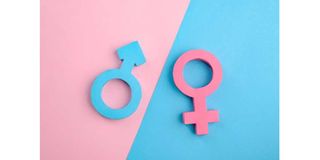Report calls for gender-equal post-Covid stimulus package

Gender equality symbol.
What you need to know:
- Covid effects had a gender dimension, more so being driven by feminisation of sectoral participation, high informality of women economic activities, gender-based violence and the burden of unpaid care work.
- The findings indicate that higher poverty levels among women contribute to increased vulnerability of women to adverse effects of Covid-19, as evidenced by the Kenya National Bureau of Statistics.
The government, in conjunction with UN Women, has launched a report that recommends a stimulus package to enhance gender equality post Covid-19.
Titled Engendering Fiscal Stimulus Packages and Recovery Efforts Adopted in Response to the Covid-19 Health and Economic Crisis, the report is based on a study thatfound out that women were more affected by Covid-19 than men.
The effects had a gender dimension, more so being driven by feminisation of sectoral participation, high informality of women economic activities, gender-based violence and the burden of unpaid care work, all of which seem to disproportionately hurt women.
The findings indicate that higher poverty levels among women contribute to increased vulnerability of women to adverse effects of Covid-19, as evidenced by the Kenya National Bureau of Statistics (KNBS) 2021 poverty report.
It is for these reasons that the research seeks to ensure the needs of women, men, girls and boys are taken into account during the implementation of the stimulus package.
The study, which assessed gender responsiveness of the fiscal and stimulus package and provides recommendations for better economic recovery outcomes, is a joint initiative between the government and UN Women.
Targeted interventions
To cushion women against the fallout from Covid-19, it has recommended the targeting of female-headed households as a category of vulnerable in cash transfer support. It has also recommended the support to small and medium enterprises with complementary measures aimed at promoting transitioning of women-led businesses from informal to formal, and enhancing reach to women through affirmative action funds.
It has also proposed the enforcement of requirements of Access to Government Procurement Opportunities in health, and gender principle in employment opportunities.
It reveals that fewer women-led than men-owned businesses borrowed from banks at 32 per cent versus 43 per cent. It also indicates more women than men borrowed from informal sectors at 36 per cent versus 21 per cent.
More women than men are less financially illiterate at 55 per cent compared to 46 per cent, even as young women accounted for about 40 per cent of Youth Enterprise Fund beneficiaries.
Also recommended is the development and implementation of special programmes for Women Economic Empowerment (WEE).
Inclusive development
UN Women Country Representative Anna Mutavati stated that as an entity for gender equality and women empowerment, her organisation endeavours to ensure no one is left behind in development.
“We know that gender equality and women empowerment are prerequisites for strong institutions, stable communities, and economies. Evidence from all around the world shows that investing in women’s economic empowerment sets a direct path towards gender equality, inclusive economic growth, and wealth creation,” said Ms Mutavati.
MacDonald Obudho, the KNBS director general, said the government has sustained Covid-19 containment measures and eased them in stages while implementing other measures geared towards alleviating the negative impacts of the virus. He cited fiscal measures like increased budgetary support to health services, economic stimulus and tax reliefs.
“I am impressed that the report of the study we are launching today is based on credible evidence of the impact Covid-19 has had on the economy and well-being of Kenyans. Further I note that, it is the opportune time to launch this study at this time that the economy is emerging from the slump,” said Mr Obudho.





